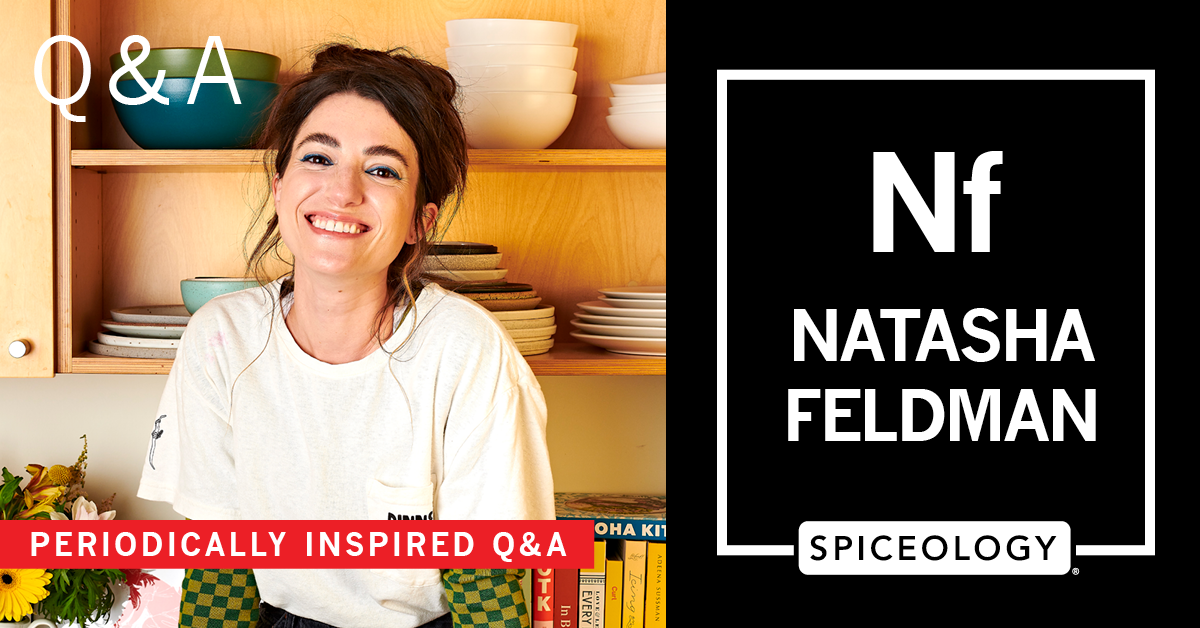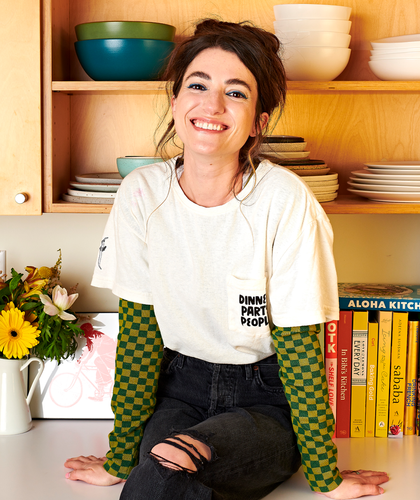
Every friend group has one: the planner.
And Natasha Feldman is the absolute culinary boss lady of hers. Better known as Tash (as in @noshwithtash), she’s here to champion and resurrect the art and endearment of the dinner party with her new cookbook: The Dinner Party Project: A No-Stress Guide to Food with Friends.
As a self-described “36-year-old Jewish grandmother who just wants to feed people” - Tash is injecting the fun back in sharing food around the table with your favorite people. And from theater kid, to culinary school dropout to foodie fave content creator - she knows a helluva lot about two things: cooking and thoughtful (but not fussy) hospitality at home.
We sat down with Tash for Spiceology’s Periodically Inspired interview series that dives deep into a chef’s creative process - why they do what they do - and to talk inspiration, process, and a lot more. Read the full interview and get to know her below:
When did you first find a love of cooking?
“My mom and dad are very pragmatic eaters - they’re eating to live, not living to eat. And that’s how I was raised: no cheese for fun, no refined sugars. Very 1970s hippie culinary movement. Don’t get me wrong, my mom is really good at cooking - but the really good stuff is just for Jewish holidays.
But my Aunt Rachel lived in France (she’s my own personal Julia Child). We’re talking schmaltzy roasted chicken, all the stinky cheese and fresh bread. I would sleep over and in the morning have eggs slowly stirred with butter. When I was a kid, I was not a good eater. You basically had to distract me in order to get me to ingest food. I didn’t really start caring about food until college. But even as a kid I always loved holiday cooking, and Jewish holidays have all that lore, traditions and stories, and I really love the tradition of coming together and sharing food.
By college I was studying theater acting in England. But once I was actually studying theater in a real setting, it turned out it was not for me. I was not nearly as serious as the other students - and I’m thinking: how did I get here?
Then I found the historic and epic Borough Market in central London, which is a produce and street food market that felt like it should be in Harry Potter. I started playing in the kitchen and cooking for people. I became the Jewish grandma of the group; I just wanted to feed people and learn things.
When I came back to the States, I realized that what I loved about the theater is storytelling, and for me, creating food media and content is literally the same thing. And I really loved it, that’s how I found my spot in the culinary world.”
Besides the food - what elements make for a fun and memorable dinner party?
“Creating an environment that’s immediately at ease is most important. And the best way to do that is through food: have snacks and beverages out and ready. You want to take the time to greet people and make them feel at home in your space.
Some hosts have their hair on fire and are running late the moment guests arrive - I say open a bag of chips and just let people know dinner is in 2 hours. Some guests will want to jump in and help cook; I never anticipate guests will help or put myself in that position where I need help unless I tell them in advance. You don't want a task master immediately - I don't bombard people at the door.”
What’s a technique or trick you learned along the way that even home cooks could use?
“I’ll pass on one that I learned from Julia Turshen: freezing garlic paste. Early on during the pandemic I was getting a lot of Instacart for pantry stuff. But because of an error I was delivered five bags of garlic - so I made a ton of this garlic paste and now do it a few times a year.
There is a sweetness that the frozen garlic imparts that’s really perfect for any cooked application. It’s also a huge time saver - my husband is not great at chopping garlic and this is such a smart and easy way to get that garlic goodness.”
What advice would you give a chef just starting out?
“One of the privileges of culinary school is they force you to learn the basics. Understand the fundamental elements and then branch out. Also, read as much as you can. Think about who you want to be and the kind of boss you want to be as early in your career as possible.”
Do you feel competitive with other chefs?
“In general, no. In the food media world the camaraderie is incredible and everyone's rooting for each other and wanting to lend a hand. We love each other’s success and we help each other along the way.”
People around you, music, books, travel, research - where do you find inspiration when you create new dishes?
First, I think about who am I cooking for. When it’s someone else's event I always try to take out what I want and put in what they want. For other people’s events - you honor what food they love.
But if I’m hosting the dinner party - the food is for me. When you have people over - you’re really showing you. The majority of inspiration comes from my cookbook collection. I have so many cookbooks that my neighbor actually gets my overflow of cookbooks. I love to see what other people are doing, and I’ll try their version then write in notes in the book on my changes. It’s so fun to dive into other people’s brains.
Travel is also an inspiration. When I travel I just want to show up and be wowed. In Spain, before the pandemic, there was this one hamburger with so many caramelized onions - I knew I had to recreate it. I know, who goes to Spain and gets inspired by a hamburger?! But here we are. It’s just so nice to absorb that inspiration when you're traveling.”
Talk to me about the process of writing your first cookbook?
“I’ve been working in food media for 15 years in so many capacities. I’ve taken this hodge podge of odd jobs over the years, and one day I woke up and realized I had enough experiences, skills and stories for a cookbook.
When Iwas in culinary school I’d go home to practice what we learned in class and then have all this food leftover, so I invited friends over to eat it. That helped me build a very strong a very good core group of friends in Los Angeles.
When I started thinking about a cookbook, I asked myself: wait, why me? I have no uniqueness. I started thinking about how we’ve become a more digital society, and that the dinner party has become scarce, but still important. And there are growing numbers of people who feel isolated and not close to anyone or don’t have a person they could tell everything to. And I have 12 of those people. Twelve people I feel incredibly close to. And it’s because of this ritual of dinner partying.
So I had my idea: a cookbook about finding your voice as a person who hosts dinner parties. And not a Martha Stewart type of dinner party - more about active community building. My hope is that people will establish a practice of having a dinner party once a month. And I wanted to talk about different styles of parties and try to make it so everyone can find their lane.”
What’s a spice you consider under-valued?
“Dry dill. If you really want your food to taste like great grandma old country - there's something about the herbaceousness and depth you get with dried dill. It’s better than fresh, and it’s an herb that takes on new meaning when it's fried.”
What’s one of your favorite ingredients to cook with and why?
“In the fall I love apples, especially using them in more savory preps: sauteing and roasting or eating them raw. You can keep them in the fridge for a long time - I mean, what is better than a Granny Smith apple and goat cheese?”
What do you consider a chef’s role to be within the community?
“Gathering around food breaks down barriers unlike anything else. A chef’s role is to garner and foster spaces where people can be vulnerable and connect together; you're creating an environment for that to happen.
It’s also to push boundaries, broaden horizons, explore creativity, and be a voice of the past. It’s such a fun exploratory job.”
Favorite nosh to cook for yourself?
“I eat pasta 100% of the time. There's no pasta I don’t like. It could be mac and cheese, brisket pasta, or just plain ole’ butter noodles with broccoli!”
Favorite nosh to cook for friends and family?
“Brisket. The same recipe my family has made for generations; it’s the warmest, coziest, most close-to-my-heart recipe and it smells incredible while it’s cooking.”
What are your breakfast, lunch and dinner restaurant recs when in and around Los Angeles?
Note: Tash quickly raddled off so many that we listed them all out for ease of scanning.
“For breakfast you have two options:
- Gjusta in Venice - it’s an all-day market cafe - fresh bread, fresh seasonal fruit and veggies - it’s LA at its finest.
- Dupar’s - it’s the oldest LA diner and you need to go for the pancakes. They keep the recipe secret and it drives me batty.
Lunch, either go to:
- Tacos Por Favor - the burritos are really solid. You can't go wrong and the carnitas are beyond. delicious.
- La Azteca in Boyle Heights - they make a chile relleno burrito you need to have - insider tip: wait 10 minutes to eat it otherwise you will destroy your mouth.
- Kiff Kafe - it has a lovely little outdoor patio that makes you feel like you’re in a courtyard in Europe. They also make delicious sandwiches, tartines and salads.
Then dinner I love:
- Bestia - they consistently knock it out of the park. If you’re looking to burn some cash, get a big chunk of meat and pasta.
- Park’s BBQ - has the best banchan in LA.
- Jon & Vinny’s - it’s quick, fun and easy. Get the meatballs and chopped salad - the meatballs come with olive oil drenched focaccia and fresh ricotta.”


